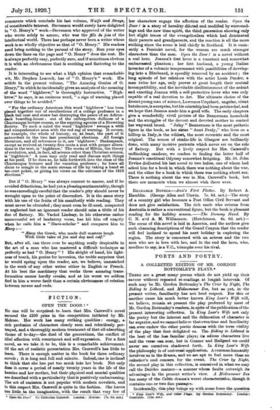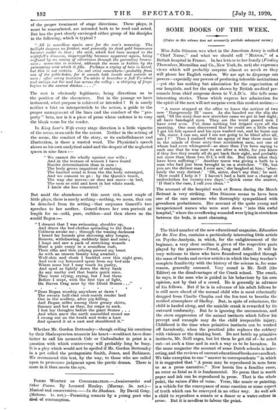POETS AND POETRY.
A COLLECTED EDITION OF MR. GORDON BOTTOMLEY'S PLAYS.* THERE are a great- many poems which do not yield. up their savour without repeated re-readings. at longish intervals. Of such may be Mr. Gordon Bottomley's The Crier by Night, The Riding to Lithend, and Midsummer Eve, but as- - yet, in the present writer, familiarity has not. bred respect. For this or another cause his much better known King Lear's Wife will, we believe, remain at present the play. preferred by most of Mr. Gordon Bottomley's readers, in spite of the publication of the present interesting collection. In King Lear's Wife not only the poetry but the interest and. the delineation of character is far superior, and we cannot believe that even time and familiarity can .ever endow the other poetic dramas with the terse virility of the play that first delighted us. The Riding to Lithend is the best- of the less familiar plays; its odious characters -live and: the verse eau soar, but in Gunner and Hallgerd we could never see ourselves. shadowed forth. In King Lear's Wife the philosophy is of universal -application. A common humanity involves us in the drama, and we are apt to feel more than an onlooker's cool concern for: the event. The Crier by Night, the second play in this collection, is conoeived in what-we may call the Doirdre manner—a manner whose faults outweigh its advantages in the present writer's view. A Midsummer Eve has many of the Celtic. drama's worst. characteristics,. though it contains.one.or two fine passages:
Incidentally, this play brings up with.some force the .question
• Ring. Lear's Wife, and Other Plays. By Gordon Bottomley. London: Constable. [16s. net.] of the proper treatment of stage directions. These plays, it must be remembered, are intended both to be read and acted. But has the poet clearly envisaged either group of his disciples in the following, which is typical ?
" All is soundless again save for the cow's moaning. The twilight deepens no farther, and presently its dead gold brownness becomes cooler in tone ; the mist, which had been merged in the nightfall's dimness, imperceptibly becomes apparent again, being suffused by an oozing of silveriness through the pervading brown- ness ; ?noon-rise is evident, although the moon is hidden by the permeating mist which it fills. Perhaps a crying of bats is heard, but this is not certain. An owl cries somewhere—probably from one of the gable-holes, for it sounds both inside and outside at once ; after many tentative Tu-whits it launches a full Tu-whoo and swings out far and low across the valley : a chirping of frogs begins in the nearest ditches 71
The rest is obviously legitimate, being directions as to the position of the characters. But in the passage we have instanced, what purpose is achieved or intended ? It is surely neither a hint on interpretatioh to the actors, a guide to the proper management of the lines and the conduct of the " pro- perty " bats, nor is it a piece of prose whose cadence is to vary the blank verse for the reader.
In King Lear's Wife every stage direction is a little vignette of the scene, or an aside for the actors. Neither in the setting of the scene, the conduct of the story, or its embellishment and illustration, is there a wasted word. The Physician's speech shows us his own analytical mind and the despair of the neglected queen in nine lines :-
" We cannot die wholly against our wills ; And in the texture of women I have found Harder determination than in men : The body grows impatient of enduring,
The harried mind is from the the body estranged, And we consent to go : by the Queen's touch, The way she moves—or does not move—in bed, The eyes so cold and keen in her white mask, I know she has consented."
But amid the abundance of this most rich, most ample of little plays, there is surely nothing—nothing, we mean, that can be detached from its setting—that surpasses Goneril's two speeches to her mother. Goneril draws her own portrait at length for us—cold, pure, ruthless—and then shows us the sordid Regan :-
" I dreamt that I was swimming, shoulder up,
And drave the bed-clothes spreading to the floor : Coldness awoke me ; through the waning darkness I heard far hounds give shivering eery tongue, Remote, withdrawing, suddenly faint and near ; I leapt and saw a pack of stretching weasels Hunt a pale coney in a soundless rush, Their elfin and thin yelping pierced my heart
As with an unseen beauty long awaited ;
Wolf-skin and cloak I buckled over this night-gear, And took my honoured spear from my bed-side Where none but I may touch its purity, And sped as lightly down the dewy bank As any mothy owl that hunts quick mice.
They went crying, crying, but I lost them Before stept, with the first tips of light, On Raven Crag near by the Druid Stones . .."
• .
"Does Regan worship anywhere at dawn ?
The sweaty half-clad cook-maids render lard Out in the scullery, after pig-killing,
And Regan sidles among their greasy skirts, Smeary and hot as they, for craps to suck. I lost my thoughts before the giant Stones . . . And when anew the earth assembled round me I swung out on the heath and woke a hare And speared it at a cast and shouldered it."
Whether Mr. Gordon Bottomley—though calling his creations by their Shakespearian names in his heart—wouldnot have done better to call his monarch Cole or Cadwallader in print is a question with which controversy will probably long be busy. It is a play which would not be spoiled if Mr. Gordon Bottomley in a pet called the protagonists Smith, Jones, and Robinson. We recommend this test, by the way, to those who are called upon to pronounce judgment upon the poetic drama. There is more in it than meets the eye.



































 Previous page
Previous page